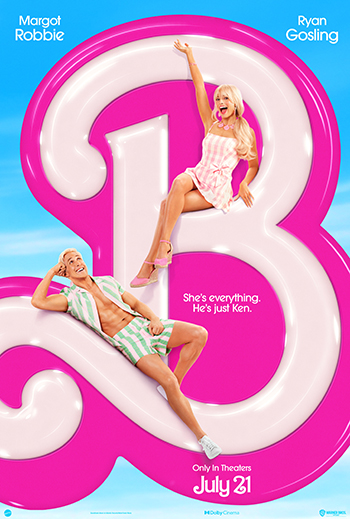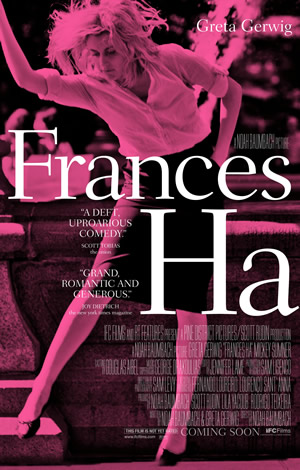Movies

New Releases • A-D • E-H • I-P • Q-Z • Articles • Festivals • Interviews • Dark Knight • Indiana Jones • MCU
Barbie, starring Margot Robbie and Ryan Gosling with a star-studded cast of Barbies and Kens
Teaser and trailer: Warner Bros.
Barbie
Directed by Greta Gerwig
Rated PG-13
Dressed 21 July 2023
#BarbieMovie
As a major studio release based on a decades-old toy line targeting girls, Barbie breaks the mold.
Cellulite
Writer-director Greta Gerwig is a smart filmmaker who’s spent considerable time in front of the camera in movies including the black-and-white Frances Ha, but she’s also an Oscar-nominated screenwriter (Lady Bird and Little Women) and director (Lady Bird).
As Barbie begins, Gerwig starts strong with a spoof of the opening of 2001: A Space Odyssey. Instead of a giant black monolith, it’s a giant Barbie doll bearing a striking resemblance to Margot Robbie, decked out in high heels and a black-and-white bathing suit. Instead of chimps, it’s a bunch of little girls who get so riled up by the electric aura of Huge Barbie, they start throwing their baby dolls around and crushing them into pieces. For little girls growing up before 1959, when the first Barbie doll was released by Mattel, that’s all they had. Baby dolls. And the promise of a fulfilling lifetime of motherhood. And precious little else.
Yeah. Barbie broke the mold all the way back in the 1950s and she’s been at it ever since. As Gerwig’s witty screenplay sells it, the whole idea of Barbie was to inspire all the girls in the real world to be happy, fulfilled and powerful.
One of the pleasant surprises about Gerwig’s Barbie is she was able to get Mattel (and to a lesser extent Warner Bros.) to poke fun at itself and life in its corporate offices in beautiful downtown El Segundo.
Some of the dolls and toys in the movie’s extended Barbie family are so bizarre, they warrant a post-movie surf & search. Turns out there really were some stunning marketing blunders and head-scratchers along the way. Allan (gamefully played by Michael Cera) really was Ken’s buddy back in ’64. (Hey! Ken’s clothes fit him, too!) Sugar Daddy Ken and Earring Magic Ken tried desperately to give Ken some semblance of social relevance in a Barbie world.
Which is more shocking? Pregnant Midge, released in 2002? Or how about “Growing Up” Skipper, released in 1975 and featuring a mechanism to make the doll’s boobs grow bigger?
Wowza.
Testosterone
Given the state of Barbieland, a colorful world dominated by the color pink, it’s no wonder Ryan Gosling’s Ken is burdened with such a massive inferiority complex. He figuratively only exists and has a reason for living when he’s in the gaze of Barbie and — unfortunately for Ken — that gaze is never, ever a longing one.
While some of that comedy around Ken and his simplemindedness runs a little juvenile, it’s fair game given all the movies and other pop culture riddled with empty-headed babes and bimbos. For decades, James Bond movies were ridiculed for their Bond girls, which only became more embarrassing the more they tried to course-correct with ideas like co-starring Tanya Roberts as a scientist. Good idea. Poor execution.

Barbie is most definitely a turning of the tables. Quite a bit of the comedy is gold, including the use of Matchbox Twenty’s song Push. Gotta appreciate the lyrics to appreciate the humor as Ken asks Barbie if she wants him to play the guitar “at” her. Unfortunately for her, she says yes. Fortunately for audiences, it turns into quite a spectacular joke in which Ken sings the song for four hours (“in-movie” time), eventually being joined by a bunch of other Kens attempting to swoon their Barbies with a song essentially expressing Ken’s desire to push Barbie around — most likely at the beach, of course.
Heart
Move past the obnoxious (and tiresome) anti-capitalist rant of Sasha (Ariana Greenblatt), a high-schooler in Barbie’s real world. That nonsense about everything being fascist and discussions of “sexualized capitalism” is misplaced aggression. Take away her iPhone (or whatever her smartphone of choice might be) and her access to social media and her tone would change in a heartbeat.
It's a sentiment that pops up on occasion, always with fervor, never with real substance.
But, in fairness, Sasha’s anti-capitalist stance flies in the face of her own mother, Gloria (America Ferrera), who works at Mattel and who, as a little girl, had a collection of Barbie dolls. Gloria’s going through an existential, mid-life crisis. Revisiting her Barbie dolls (which her own daughter has no interest in whatsoever) and thinking about her own childhood has created a tear in the portal between reality and Barbieland.
As Gerwig navigates the bombast, the color, the gender war and corporate gobbledygook, she takes audiences right to the heart of it all: Ruth Handler. Born in Denver, Colo., in 1916, Ruth created Barbie and named her after her own daughter. Handler also co-founded Mattel with her husband. Rhea Perlman steps in as Ruth and brings a pitch-perfect voice of reason, a calming presence to the madness.
Ruth, so fittingly, is the hook to bring it all back to home and bring back to center the purpose of Barbie.
Estrogen
At its core, Barbie is about the gender power struggle and it’s loaded with thoughts around existentialism and the relationship between toys and their owners, taking things to a wholly new, more sophisticated level from Toy Story’s heartwarming tales. Barbie’s loaded with meta and its pop culture references — both specific to Barbieland and the rest of the world — makes it the kind of movie that can sustain repeat viewings.
But maybe Barbie should take a step back (in her high heels, not those Birkenstocks, of course) and reassess the world around her.
What would be helpful is for society to honestly acknowledge it takes both. It’s a fantasy that everything would be better with female leadership; it’s simply not true. It’s not about the gender. It’s about the mind, it’s about the person. This writer’s career has endured some of the worst managers in history, both male and female. Incompetence pierces through all race, creed, color, religion and gender considerations.
It takes a village. It takes checks and balances. It really does take all kinds. Barbie raises a lot of discussions by swinging the pendulum, but true justice and real equality requires those scales find a steady state, equilibrium. As the saying goes, “None of is us equal until all of us are equal.”
Feet
Historically, making a live-action movie based on a line of children’s toys is a dicey proposition. The results have typically tracked along the same lines as failed video game adaptations. But, much like comic book movies struggled to avoid the cheese and empty calories before finally finding some substance with the Dark Knight trilogy and the subsequent bonanza of the Marvel Cinematic universe, video game adaptations are finally starting to hit their stride with the stunning theatrical success of The Super Mario Bros. Movie and popularity of The Last of Us streaming series.
With toys, some movie screens are still stained by misfires dating back to the atrocious Masters of the Universe (1987). G.I. Joe has seen middling success; Retaliation (2013), for example, played out like a movie written by a couple 10-year-old boys throwing their action figures around the living room. Transformers (2007) became a huge, big-budget movie series that still struggled under Michael Bay’s own childish and crass sensibilities, but this year’s Rise of the Beasts turned into a surprising artistic success while being a commercial disappointment.
This past spring, Dungeons & Dragons was another step in the right direction, taking the role-playing game and conjuring up an entertaining movie that — and it’s been a theme throughout 2023 — failed to attract mass audiences.
Maybe Transformers is the best point of comparison to Barbie. Think about the sexism of goofy Shia LaBeouf’s teenage romance with super-hottie Megan Fox, who went around sporting ultra-short shorts while tinkering under car hoods.
Barbie is most certainly a poke in the eye to a lot of male-dominated social mores and business cultures and, for the most part, it works as a clever, colorful assertion of womanhood. But it’s not quite as perfect as the titular character and her many, many iterations. That would require a little more balance. Not only in the power dynamics, but also in the color palette.
• Originally published at MovieHabit.com.




